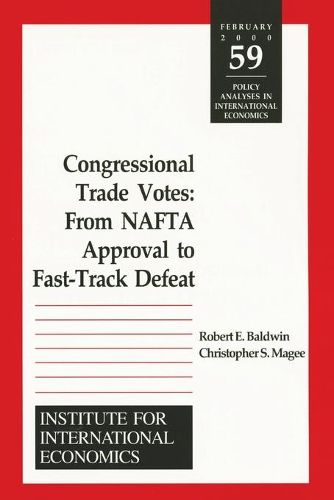Readings Newsletter
Become a Readings Member to make your shopping experience even easier.
Sign in or sign up for free!
You’re not far away from qualifying for FREE standard shipping within Australia
You’ve qualified for FREE standard shipping within Australia
The cart is loading…






The unwillingness of the US House of Representatives to renew fast-track authority in 1997 and 1998 means that further trade liberalization for the United States is likely to slow down or grind to a halt, since negotiators elsewhere know that any agreements reached could be modified by the US Congress. This political impasse raises several overarching questions: Does the status of fast track represent a temporary or a permanent setback in the postwar trend toward freer trade? Is it due simply to lax efforts in mobilizing groups that support trade liberalization, or is US trade policy becoming more protectionist? More generally, what were the most important economic and social factors shaping congressional voting on trade legislation in the 1990s? How do these factors differ for the various trade bills Congress considered over this period? Baldwin and Magee attempt to answer these questions by analyzing three key trade bills: NAFTA in 1993; the legislation implementing the Uruguay Round agreements in 1994; and the House bill seeking to renew fast-track authority in 1998. The authors provide a brief legislative history of each, and then outline a conceptual framework for their analysis. Focusing on district and state economic conditions, ideological leanings, and campaign contributions, they find both predictable and surprising relationships in the data.
$9.00 standard shipping within Australia
FREE standard shipping within Australia for orders over $100.00
Express & International shipping calculated at checkout
The unwillingness of the US House of Representatives to renew fast-track authority in 1997 and 1998 means that further trade liberalization for the United States is likely to slow down or grind to a halt, since negotiators elsewhere know that any agreements reached could be modified by the US Congress. This political impasse raises several overarching questions: Does the status of fast track represent a temporary or a permanent setback in the postwar trend toward freer trade? Is it due simply to lax efforts in mobilizing groups that support trade liberalization, or is US trade policy becoming more protectionist? More generally, what were the most important economic and social factors shaping congressional voting on trade legislation in the 1990s? How do these factors differ for the various trade bills Congress considered over this period? Baldwin and Magee attempt to answer these questions by analyzing three key trade bills: NAFTA in 1993; the legislation implementing the Uruguay Round agreements in 1994; and the House bill seeking to renew fast-track authority in 1998. The authors provide a brief legislative history of each, and then outline a conceptual framework for their analysis. Focusing on district and state economic conditions, ideological leanings, and campaign contributions, they find both predictable and surprising relationships in the data.